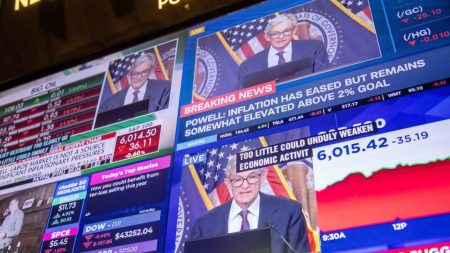The cryptocurrency industry hit another milestone when new spot Ethereum exchange-traded funds (ETFs) began trading on U.S. exchanges July 23, 2024.
Trading came just six months after the landmark approval of spot Bitcoin ETFs in January. Now, everyday investors can buy and sell the world’s two largest cryptocurrencies right from their brokerage account, further pushing the once-shadowy realm of digital currency into regulated mainstream finance.
Here’s what you should know about Ethereum ETFs.
What is an Ethereum ETF?
A spot Ethereum ETF is an investment vehicle that pools money from investors to purchase Ethereum directly. The fund is managed by an investment firm and is traded on a traditional stock exchange, providing a more accessible and regulated way to trade digital currency.
Futures-based Ethereum ETFs were launched in February 2021, but this method often resulted in higher costs for investors and could lead to price discrepancies due to differences between futures and spot prices.
These new spot funds — first approved by the Securities and Exchange Commission (SEC) in May 2024 — will directly hold Ether, the native cryptocurrency of the Ethereum blockchain. This development follows the approval of spot Bitcoin ETFs earlier in 2024, further integrating cryptocurrencies into traditional financial markets.
Eight asset management firms, including Grayscale, Bitwise, Fidelity, BlackRock and Invesco, received approval to offer spot Ethereum ETFs, which began trading July 23. The majority of spot Ethereum ETFs proposed expense ratios ranging from 0.19 to 0.25 percent of assets under management — relatively low cost, especially considering the sometimes-hefty commissions to buy and sell cryptocurrency.
So far, the new ETFs appear to be a hit. All nine Ethereum ETFs collectively had about $1.1 billion in trading volume on their first day of trading, according to Bloomberg Intelligence.
Who should invest in Ethereum ETFs?
Ethereum ETFs offer a more traditional investment pathway into the cryptocurrency market. Unlike directly purchasing Ethereum, which requires understanding digital wallet storage and exchange platforms, ETFs simplify the process by bundling Ethereum within a familiar investment structure. This accessibility could potentially attract more institutional investors and even individual investors who don’t want to deal with crypto exchanges.
However, investors who buy Ethereum ETFs will miss out on staking rewards, which can generate passive income for coin holders. The SEC only approved Ethereum ETFs after staking was taken off the table for the ETFs. As a result, investors may earn higher returns by staking ether directly on an exchange rather than holding ether as an ETF.
Ethereum ETFs may be suitable for long-term investors seeking diversification or exposure to blockchain technology. However, it’s important to note that Ethereum remains a high-risk investment with a relatively short trading history and no underlying cash flows to support its value.
How do you buy an Ethereum ETF?
Ethereum ETFs are traded on traditional exchanges, including the Nasdaq, so they can be purchased through most online brokerages that offer traditional investments such as stocks and bonds. While some brokerages, such as Robinhood, also offer investors the option to purchase crypto directly, others may offer only Ethereum futures.
For investors seeking a wider range of cryptocurrencies and direct ownership of digital coins, crypto exchanges such as Binance and Coinbase are necessary. However, it’s important to note that these platforms are currently facing increased regulatory scrutiny from the SEC.
Ethereum ETFs
| ETF | Ticker | Expense ratio |
|---|---|---|
| Grayscale Ethereum Mini Trust | ETH | 0.15% |
| Franklin Ethereum ETF | EZET | 0.19% |
| VanEck Ethereum ETF | ETHV | 0.20% |
| Bitwise Ethereum ETF | ETHW | 0.20% |
| 21Shares Core Ethereum ETF | CETH | 0.21% |
| iShares Ethereum Trust | ETHA | 0.25% |
| Invesco Galaxy Ethereum ETF | QETH | 0.25% |
| Fidelity Ethereum Fund | FETH | 0.25% |
| Grayscale Ethereum Trust | ETHE | 2.5% |
To attract investors, many issuers are waiving expense ratio fees for the first six months or a year, or until the fund reaches a specific asset level.
Other types of crypto-related investments
As crypto goes mainstream, there are more ways to invest in it than ever before.
Here are some alternative options.
Direct cryptocurrency investment
For direct exposure to cryptocurrencies, investors can purchase them through a cryptocurrency exchange. While brokerages offer a limited selection of crypto offerings, often focusing on major coins, exchanges provide a broader range of options. However, investors should be aware of potential fees and the complexities associated with cryptocurrency trading.
Blockchain ETFs
Blockchain ETFs offer indirect exposure to the cryptocurrency ecosystem. These funds invest in companies utilizing blockchain technology, including cryptocurrency businesses, tech giants and financial institutions.
Crypto-related stocks
Investors can also purchase shares of companies directly involved in the cryptocurrency industry. Examples include exchanges such as Coinbase as well as companies such as PayPal and Robinhood that offer cryptocurrency services. You’ll need to conduct thorough research on each company to understand its specific exposure to the cryptocurrency market.
Bottom line
Traders gained access to Ethereum ETFs in July 2024. While challenges and uncertainties remain, the approval of Ethereum ETFs is another sign of the growing maturity and acceptance of the crypto industry. Aside from Ethereum ETFs, investors can also gain exposure to cryptocurrency by investing in stocks of crypto-related companies, blockchain ETFs or by directly purchasing digital coins through exchanges.
Editorial Disclaimer: All investors are advised to conduct their own independent research into investment strategies before making an investment decision. In addition, investors are advised that past investment product performance is no guarantee of future price appreciation.
Read the full article here









